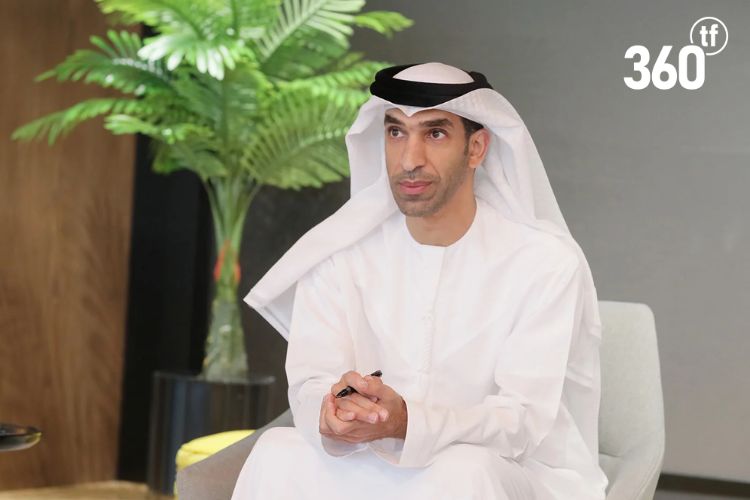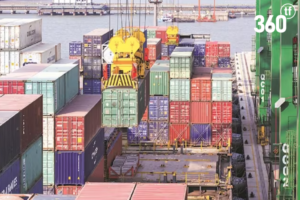The UAE is planning to launch a new Services Export Strategy to make it easier for the service sector leverage the country’s trading relationships, which continue to expand thanks to the success of the Comprehensive Economic Partnership Agreements (CEPA) programme, a top official says.
Dr Thani Al Zeyoudi, Minister of State for Foreign Trade, said new Services Export Strategy will be launched in partnership with the private sector.
“The aim of the Export Services Strategy is clear — to enhance the competitiveness of the UAE’s services sector and promote the growth of the country’s services exports. With our strong value proposition, we have established a distinct competitive edge,” Dr Thani told BTR.
In an exclusive interview, Dr Thani discusses how a new Services Exports Strategy is set to expand their contribution to UAE’s foreign trade, which is on track to hit Dh4 trillion ($1.09 trillion) by 2031. He said services exports constitute more than two thirds of the world’s economic output.
“We have an ambitious, holistic approach to trade. With the Services Exports strategy now underway, we are well positioned to achieve the targets set, and look ahead to leveraging a diversified trade mix to meet shifting global demand,” Dr Thani said.
Excerpts of the interview:
Firstly, why are services exports so important to the UAE?
The nature of trade is changing and services exports — the cross-border sale or supply of services rather than goods from one country to another — is flourishing. While trade in goods remains a bedrock of the global trading system, trade in services is becoming an ever-larger part of the trading mix, growing 60 per cent faster than trade in goods over the past decade. And the UAE’s performance is outstripping the global trend.
In the last eight years, as the nation’s economy has grown and diversified, services exports have increased four times faster than the rest of the world, which has helped to bolster our status as a knowledge-driven, service-based economy. Today, nearly 20 per cent of the UAE’s overall foreign trade comprises services trade – which equates to $250 billion.
Why the need for a services exports strategy?
In 2022, according to the World Trade Organisation (WTO), the UAE was the world’s 12th largest service exporter, with a total value of $154 billion accounting for 2.2 per cent of global services exports. While this is an enormous achievement, global services exports hit $7.2 trillion in 2022, representing 25 per cent of the value of total global exports and 11.8 per cent of the world’s GDP, which underlines the huge potential for us to diversify our economy in this direction.
This is why we are launching a new Services Export Strategy in partnership with the private sector: to make it easier for the service sector in the UAE to leverage our trading relationships, which continue to expand thanks to the success of the Comprehensive Economic Partnership Agreements (CEPA) programme.
What are the key sectors and areas of focus?
Travel and tourism, two key service exports driven by Emirates, Etihad and our unrivalled offering as a global travel destination, are prime examples of how the UAE has taken an increasing share of the global market in recent years. They also offer a template for success in a range of sectors, and our strategy is focused on nine industry verticals in which we have proven capabilities, namely: travel and tourism, ICT, professional services, financial services, education, medical tourism, Islamic financial services, the creative economy, and logistics.
The aim of the Export Services Strategy is clear: to enhance the competitiveness of the UAE’s services sector and promote the growth of the country’s services exports. With our strong value proposition, we have established a distinct competitive edge.
What are the pillars of the strategy?
We understand that, as a government, we are not the experts. Business knows what is best for business, and we see our role as establishing the framework to enable companies succeed both here and in new markets. To that end, we are setting up taskforces for each sector, which will be public-private collaborations charged with formulating a clear, sector-specific roadmap, creating data-backed targets, identifying new markets and in-demand products, developing new enhancement initiatives and working with different trade agencies and offices here and abroad to promote opportunities. We have already started the process of recruiting industry leaders to join these task forces.
What is your strategy to formulate data?
When it comes to formulating a strategy, having the right data is essential and we are making sure the data collection is best-in-class. This is being handled by the Federal Competitiveness and Statistics Centre (FCSC), which will harmonise data collection across all government entities and work with the WTO to ensure that the processes are fully aligned with global standards.
Part of our overall economic diversification strategy rests on increasing digitisation across government services and the wider economy. This also applies to trade, and data analytics is in line with our wider goals of building a new era of technology-led, evidence-driven, positively disrupted trade — which is a message we will be taking into the discussions as host of the WTO’s MC13 in February 2024.
Can you talk a little more about how this initiative fits with broader national objectives?
We have an ambitious, holistic approach to trade. Our Comprehensive Economic Partnership Agreement programme, which is opening up important new markets for our exporters by removing tariffs and boosting investment flows, is supported by our re-exports strategy, which is consolidating our status as a global supply-chain hub, and our NextGenFDI programme, which is bringing some of the most exciting and dynamic digital businesses to our rapidly expanding ecosystem. In time, these companies will become future export success stories.
These are all critical pillars our long-term diversification ambitions. With the Services Exports strategy now underway, we are well positioned to achieve the targets set, and look ahead to leveraging a diversified trade mix to meet shifting global demand.
Courtesy: khaleejtimes.com




